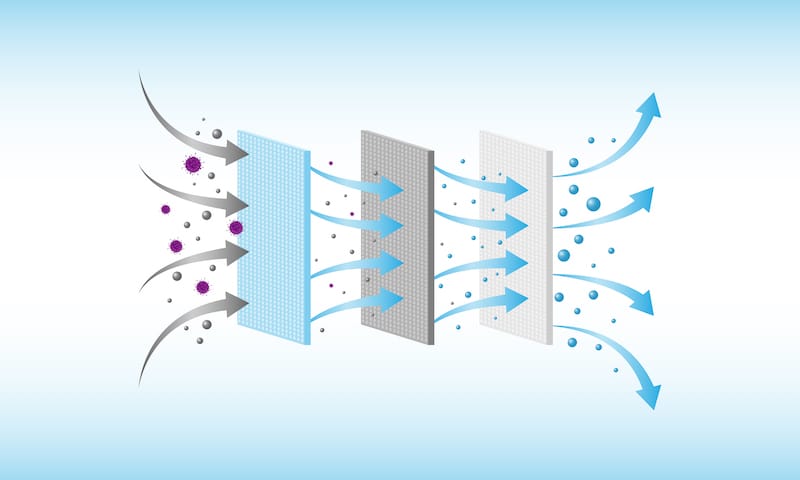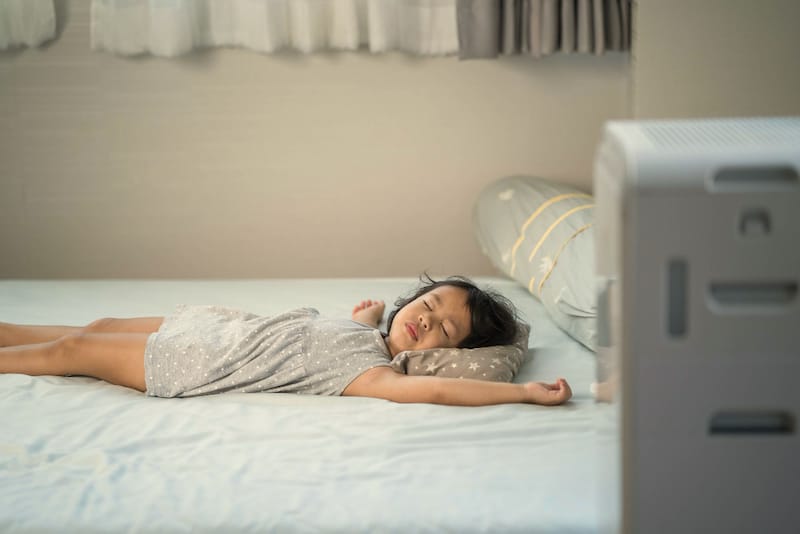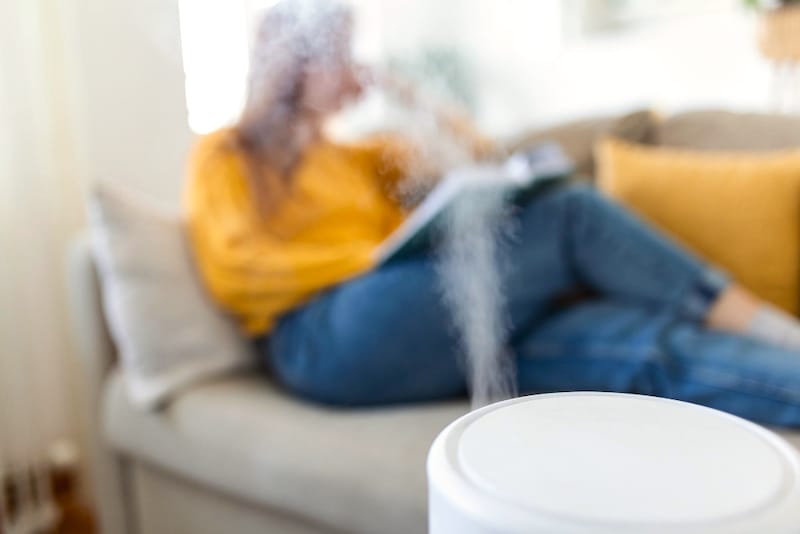An air purifier collects air, runs it through various filters within the device, and releases the freshly filtered air back for recirculation. While an air purifier can help minimize indoor air pollution and relieve allergies, it may also have drawbacks like noisiness and energy consumption. Therefore, air purifiers can be a waste of money if you’re already living in a reasonably healthy environment and on a tight budget. However, air purifiers can be completely worth it if the situation is not so and if you’re facing respiratory problems. You can also select your ideal air purifier from various types that cater to specific needs. Or you can quickly resort to healthier and less expensive alternatives like beeswax candles and houseplants.
An air purifier is an appliance that removes contaminants in the air to improve the air quality in a certain room.
This type of device is mainly marketed to people that suffer from allergies, asthma, and second-hand cigarette smoke.
However, you might also prefer to purify the air around you because of any odd odors or to create a refreshing environment after a hectic day.
Either way, the first question that’ll pop into your head is whether buying an air purifier would be worth it or a waste of money in the long run. Well, think no further!
How does an air purifier work? What are the pros and cons of buying an air purifier? Are air purifiers a waste of money? Which type of air purifier would suit you best? Are there natural alternatives to air purifiers that cost less?
How does an air purifier work?
An air purifier works through a fan that collects air and passes it through various filters.

These filters collect any pollutants trapped in the air before releasing the air for recirculation.
Rota filters trap tiny dust particles by rotating at an excessively high speed.
Filters such as charcoal filters may be used to dispose of any odors in the air, while filters like HEPA, also known as high-efficiency particulate absorbing filters trap tiny pollutant particles like dust, pollen, bacteria, and mold in the air.
A 2015 study conducted by the US National Library of Medicine revealed the success rate of the HEPA filter, which in the study filtered 70% of 0.3-μm particles and 95% of 1.0-μm particles.
By running the air through multiple filters in this manner, this device can be immensely useful in lowering the concentration of indoor air pollution.
These devices can be installed in a particular room or can even be installed in your HVAC system, which can provide a strong filtration of air in your entire home.
Pros and cons of an air purifier
To make a proper decision on whether an air purifier can be a waste of money, it’s best to study the advantages and disadvantages of having it side by side.
The following table will help clarify this understanding:
| Pros of an air purifier | Cons of an air purifier |
|---|---|
| Minimizes indoor air pollution – You’ll be inhaling healthier air than you used to as harmful particles in the air are removed. | Emission of harmful substances – It’s important to buy such devices from a reputed brand since some air purifiers are environmentally unfriendly as they emit ozone and other harmful substances into the air. |
| Helps allergies – If you have pollen or dust allergies, an air purifier is a quick solution. A 2020 study proved the beneficial value of this device on patients with Allergic Rhinitis. | Requires regular cleaning – Regularly cleaning your air purifier might be a burden, but it’s essential. If you don’t, it can turn into a breeding ground for bacteria. |
| Improves skin – Since our skin might be sensitive to air pollution, having an air purifier is a quick solution. | May be unnecessary – If you live in a generally healthy environment, air purifiers can be counter-productive. |
| Breathing is made easier – Since your lungs are, to a great extent, free from having to deal with harmful air particles, your pulmonary system as a whole will benefit from inhaling fresh air. This aspect has been proved by studies as well. | Doesn’t work on all air particles – Air purifiers don’t get rid of all harmful substances in the air. So, it may not meet your exact expectations. |
| Improvement in sleep – If you’ve ever woken up from your sleep because of a sudden allergy, you’ll be relieved to know that this won’t happen any longer as our quality of sleep is closely connected to indoor air quality. | Light pollution – Artificial lighting from LEDs in the purifier is to be expected. So, think twice before setting it up in your bedroom. |
| Removal of bad odor in air – If you live in a busy compact home, bad odor in the air is a common nuisance. This can be easily gotten rid of with an air purifier as it removes any unpleasant smells in the room. | Takes up space – Air purifiers can be relatively big if you live in an apartment. |
| Ideal for smokers – As we know that second-hand smoke is just as damaging as first-hand smoke, air purifiers can help remove the smoke to a great extent, creating a clean and healthy environment for smokers and others living in an apartment. | Consumption of energy – An air purifier may be a bad choice from an ecological point of view as its energy is produced with the aid of fossil fuels. |
| Minimizing asthma – Although air purifiers might not eliminate asthma entirely, they’ll help reduce indoor asthma triggers. | Expensive – Air purifiers need a fair amount of electricity consumption. Based on its pricing, it might also be a bad choice if you’re on a tight budget. |
| Hospitable environment for guests – You can improve the quality of your own life and that of others in the home. | Noisy – You’ll definitely notice its noise once it’s up and running, so having it in your bedroom can be quite annoying if you’re a light sleeper. |
| Improves your overall general health – If you live in a city with high air pollution, you will notice this benefit the most as you’d daily be breathing in fresh air, which will improve your overall health and make you less prone to airborne diseases. | May not work as planned – Quality-wise, you might be facing a risk if your expectations are high. Over time you may have to replace them with new models as they aren’t long lasting. |
Are air purifiers a waste of money?

After coming to terms with all the pros and cons of air purifiers, it’s up to you to make that final decision on whether or not to buy an air purifier.
The main factor that you can consider is your budget. Air purifiers aren’t cheap at all, and apart from the cost of the device, you might also have to bear maintenance costs as well, as some brands require a regular replacement of filters.
If you’re living in a reasonably clean area rather than an urban city, you can overlook buying an air purifier as it works best in environments where air pollution is common.
If you’re thinking of buying an air purifier to get rid of allergies, or second-hand smoke, it might be a smart choice.
However, sometimes you might notice that the air purifier you brought turned out to be counter-productive. You might even experience asthma or difficulties in breathing that are triggered by your air purifier.
This is why it’s recommended to stay away from ionizing air purifiers, as they might produce ozone and trigger asthma, especially if you’re already suffering from a respiratory disease.
While it’s true that an air purifier can largely control airborne viruses and pollutants, we must also understand its limits.
When it comes to viruses such as covid-19, air cleaners and filters are not enough to protect us from such viruses.
Types of air purifiers
Based on your personal need for an air purifier, you can choose the exact type of air purifier that fulfills the function that you expect from it.
The following types of air purifiers target such variating purposes:
- HEPA Air Purifiers – These purifiers are highly effective in removing particles larger than 0.2 microns in the air, including pollen, mold, dander, and dust. While this purifier is popular for removing a wide range of irritating pollutants in the air, it fails to remove microorganisms like germs, bacteria, and viruses, which are smaller than 0.2 microns.
- Ionic Air Purifiers – Comparatively to other purifiers, this product operates without a motor, which means it won’t cause as much noise. It functions by releasing negative ions into the air, which bond with airborne positive particles like dust. This causes the dust to fall from the air. This purifier can effectively remove allergens, smoke, bacteria, fumes, dust, and even viruses from the air. The only drawback is its incapability of eliminating odors from the air.
- Activated Carbon Air Purifiers – If you’re looking to buy an air purifier to get rid of fumes of any sort, smoke, chemicals, and odor, this purifier is ideal for you. However, when it comes to removing dust, pollen, or mold in the air, this purifier would be lacking as its strong suit rests in odors and gasses in the air.
- Central air cleaners – This too is a rather silent device that primarily targets dust particles, pollen, and viruses. It’s also the ideal air purifier if you’re concerned about minimizing your allergies and asthma. Health-wise, this would be the best option out there for an air purifier.
- Electronic air cleaners – This device uses static electricity to entrap airborne pollutant particles. It can destroy 99% of allergens in the air and is popularly known as one of the most efficient air purifiers you could buy. It can trap particles as small as 3 microns and quickly zap away other pollutants in the air by positively charged ions emitting from the cleaner itself.
Are there natural alternatives to air purifiers?
While natural alternatives might not exactly compete with air purifiers, they surely can make a significant change in the purification of indoor air in your home.

The following list contains natural, healthy, and much less expensive alternatives to air purifiers if you can’t make up your mind to buy this device.
- Activated charcoal – This substance alone is highly useful in eliminating any toxins in the air. According to a 2005 study, this substance was declared commendable in removing volatile organic compounds from contaminated air carriers. Bamboo charcoal can also help purify the air; since both substances are odorless, you wouldn’t even notice it there.
- Beeswax candles – This is a very reliable technique that cleans the air in your home by emitting negative ions that bind with toxins, resulting in rapid elimination of toxins. The cherry on top is the soothing vibe that these candles give out and the fact that it doesn’t burn out soon. It’s asthma-friendly too, so you don’t have to worry about lighting it while having respiratory problems.
- Houseplants – This is one of the most effective and environmentally friendly options that most people forget. Houseplants are the best medium to counter indoor pollution. According to a 2019 study conducted by NASA, houseplants are capable of protecting us from side effects concerning toxins like ammonia, formaldehyde, and benzene in the air. The best plants to filter out toxins include Lady Palm and Peace lilies.
- Essential oils – Strong essential oils made from rosemary, lemon, cloves, cinnamon, and grapefruit are an antiseptic blend that can kill airborne viruses, fungi, bacteria, and mold. You can mix these oils into soaps and detergents and even add a few drops of it to a bowl of warm water, placing it in your room.
Conclusion
Since the worthiness of an air purifier might depend on your particular needs. You’ll first need to think about why you might need an air purifier.
Based on your answer and after assessing the heavy list of pros and cons listed, you can give your verdict.
Whether you decide to or not to buy this device, its purpose shouldn’t be taken lightly, as air purification is a growing concern in today’s industrialized world.
So even if you decide not to buy an air purifier, there’s no harm in considering other natural alternatives that will help freshen and purify the air of your home for you and your loved ones’ benefit.





